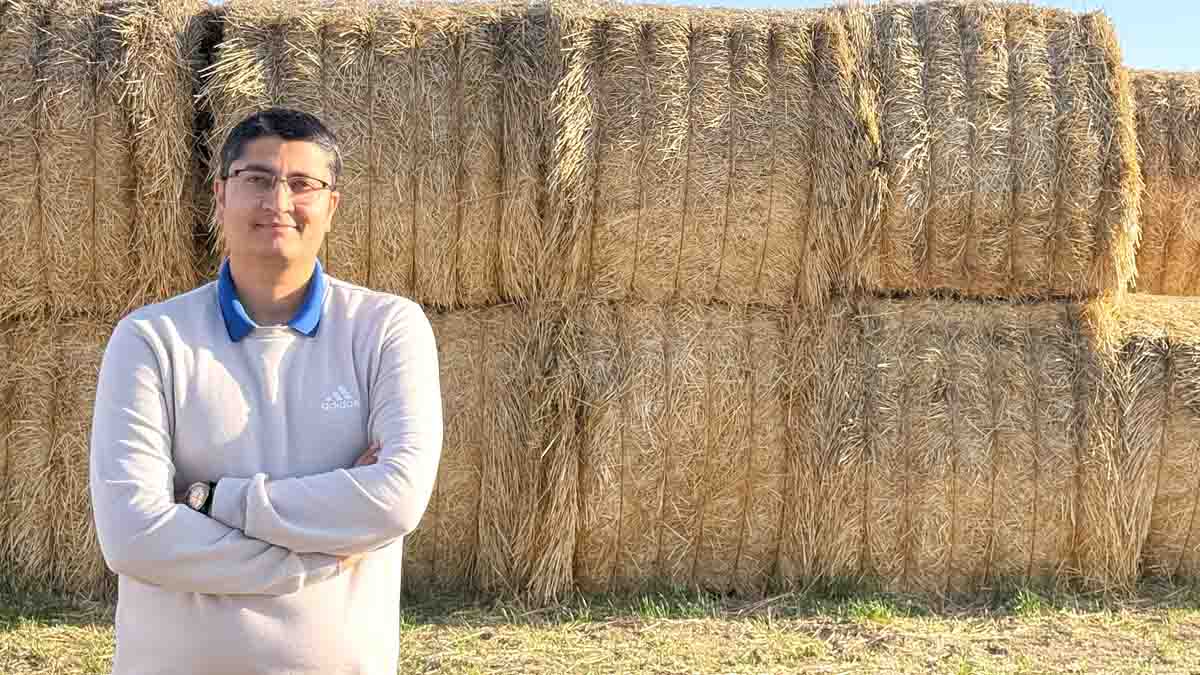New Forage Agronomist
May 28, 2025
Producing crops has always seemed like magic to Pramod Acharya, who joined University of Idaho in January as an assistant professor and Extension forage agronomy specialist.
Acharya was raised on a subsistence-scale farm in Nepal, where his family raised vegetables, grain, and a few cattle.
“I was always interested in how one tiny seed would turn into a whole plant, feeding both people and livestock,” Acharya said. “That magic stuck with me. Farming wasn’t just how we lived; it was what shaped how we saw the world.”
In his new role, Acharya will work his magic on behalf of Idaho dairymen, cattlemen and forage producers, advancing sustainable, resource-efficient, eco-friendly and economic approaches to forage production, storage and utilization.
His research and Extension interests include understanding productivity and nutritive values of annual and perennial forages, soil nutrient management, soil health and carbon management, and resource-efficient and climate-resilient forage production. He has always been fascinated by how soil, plants and livestock all connect to the bigger picture, and aims to solve the complex web of these components.
He’ll be based at U of I’s Kimberly Research and Extension Center and will also be heavily involved in research at the Idaho Center for Agriculture, Food and the Environment (Idaho CAFE), which will include the nation’s largest research dairy in Rupert and should be milking cows by early 2026.
Acharya earned a bachelor’s degree in agriculture in 2014 from Tribhuvan University in Lamjung, Nepal. He earned a master’s degree in biology in 2019 from Eastern New Mexico University in Portales, New Mexico, followed by a doctorate in plant and environmental sciences from New Mexico State University in Las Cruces, New Mexico, in 2023.
While pursuing his master’s, Acharya researched how the use of cover cropping and dairy compost in crop production systems influenced soil health. Like Idaho, eastern New Mexico and western Texas had many large dairies and heavy forage production. This marked the point at which he directed his research toward forage agronomy.
His dissertation entailed understanding the ecosystem services of cover cropping in silage corn and sorghum rotations. Cover crops are crops that are planted primarily for soil-health benefits rather than solely for commercial harvest, and they sometimes include blends of different plant species. He found the region’s producers were skeptical about using cover crops, concerned they would deplete nutrients and soil moisture for subsequent silage crops. Instead, Acharya found that cover crops improved soil organic matter, nutrient recycling, soil water infiltration and soil retention, and subsequent silage yield, more than offsetting the water and nutrients that they used.
Acharya has been evaluating several potential research projects benefiting Idaho forage farmers and livestock producers. He plans to evaluate how well the different varieties of perennial, non-bloating legumes — sainfoin, cicer milkvetch and birdsfoot trefoil — establish and provide forage in southern Idaho for comparison with alfalfa. He also intends to evaluate various blends of the legumes and grass species with alfalfa to identify combinations that reduce bloating in cattle while delivering the proper nutrition.
Another trial on his list of potential projects would evaluate if there’s sufficient time to raise cover crops as additional forage for grazing immediately after 95-day silage corn in Magic Valley’s climate.
Acharya’s wife, Manisha, is also an agricultural researcher. They have a 2-year-old daughter, Shreya.

About the University of Idaho
The University of Idaho, home of the Vandals, is Idaho’s land-grant, national research university. From its residential campus in Moscow, U of I serves the state of Idaho through educational centers in Boise, Coeur d’Alene and Idaho Falls, nine research and Extension centers, plus Extension offices in 42 counties. Home to more than 12,000 students statewide, U of I is a leader in student-centered learning and excels at interdisciplinary research, service to businesses and communities, and in advancing diversity, citizenship and global outreach. U of I competes in the Big Sky and Western Athletic conferences. Learn more at uidaho.edu.






